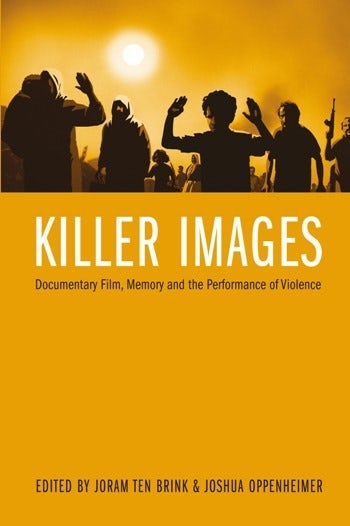Killer Images
Documentary Film, Memory, and the Performance of Violence
Wallflower Press

Killer Images
Documentary Film, Memory, and the Performance of Violence
Wallflower Press
Cinema has long shaped not only how mass violence is perceived but also how it is performed. Today, when media coverage is central to the execution of terror campaigns and news anchormen serve as embedded journalists, a critical understanding of how the moving image is implicated in the imaginations and actions of perpetrators and survivors of violence is all the more urgent. If the cinematic image and mass violence are among the defining features of modernity, the former is significantly implicated in the latter, and the nature of this implication is the book's central focus.
This book brings together a range of newly commissioned essays and interviews from the world's leading academics and documentary filmmakers, including Ben Anderson, Errol Morris, Harun Farocki, Rithy Phan, Avi Mograbi, Brian Winston, and Michael Chanan. Contributors explore such topics as the tension between remembrance and performance, the function of moving images in the execution of political violence, and nonfiction filmmaking methods that facilitate communities of survivors to respond to, recover, and redeem a history that sought to physically and symbolically annihilate them
This book brings together a range of newly commissioned essays and interviews from the world's leading academics and documentary filmmakers, including Ben Anderson, Errol Morris, Harun Farocki, Rithy Phan, Avi Mograbi, Brian Winston, and Michael Chanan. Contributors explore such topics as the tension between remembrance and performance, the function of moving images in the execution of political violence, and nonfiction filmmaking methods that facilitate communities of survivors to respond to, recover, and redeem a history that sought to physically and symbolically annihilate them
Highly recommended. Choice
ten Brink and Oppenheimer suggest in this volume a collective approach to the possibilities, limits and questions that the cinematographic image sets out nowadays in relation to political violence. Cinema Comparat/ive Cinema
Acknowledgments
Notes on Contributors
Introduction, by Joram ten Brink and Joshua Oppenheimer
(De)activating Empathy
Publicity and Indifference: Media, Surveillance and 'Humanitarian Intervention', by Thomas Keenan
Shooting with Intent: Framing Conflict, by Alisa Lebow
Immersion (2009), by Harun Farocki
Anaesthetising the Image: Immersion, Harun Farcocki, by Kodwo Eshun
Revisiting Rocha's 'Aesthetics of Violence', by Michael Chanan
Memory of Violence: Visualising Trauma
Ça va de soi: The Visual Representation of Violence in the Holocaust Documentary, by Brian Winston
Screen Memory in Waltz with Bashir, by Garrett Stewart
Animating Trauma: Waltz with Bashir, David Polonsky, by Joram ten Brink
Spaces of Violence: History, Horror and the Cinema of Kiyoshi Kurosawa, by Adam Lowenstein
On Historical Violence and Aesthetic Form: Jean-Luc Godard's Allemagne 90 Neuf Zéro, by Daniel Morgan
Battle for History: Appropriating the Past in the Present
Subverting Dominant Historical Narratives: Avenge But One of My Two Eyes, Avi Mograbi, by Joram ten Brink
Re-enactment, the History of Violence and Documentary Film, by Joram ten Brink
Interpreting Jeremy Deller's The Battle of Orgreave, by Alice Correia
Remediating Genocidal Images into Artworks: The Case of the Tuol Sleng Mug Shots, by Stéphanie Benzaquen
Screening the 1965 Violence, by Ariel Heryanto
Performing Violence
Perpetrators' Testimony and the Restoration of Humanity: S21, Rithy Panh, by Joshua Oppenheimer
The Killer's Search for Absolution: Z32, Avi Mograbi, by Joram ten Brink
Impunity, by Benedict Anderson
Show of Force: A Cinema-séance of Power and Violence in Sumatra's Plantation Belt, by Joshua Oppenheimer and Michael Uwemedimo
Misunderstanding Images: Standard Operating Procedure, Errol Morris, by Joshua Oppenheimer
Index
Notes on Contributors
Introduction, by Joram ten Brink and Joshua Oppenheimer
(De)activating Empathy
Publicity and Indifference: Media, Surveillance and 'Humanitarian Intervention', by Thomas Keenan
Shooting with Intent: Framing Conflict, by Alisa Lebow
Immersion (2009), by Harun Farocki
Anaesthetising the Image: Immersion, Harun Farcocki, by Kodwo Eshun
Revisiting Rocha's 'Aesthetics of Violence', by Michael Chanan
Memory of Violence: Visualising Trauma
Ça va de soi: The Visual Representation of Violence in the Holocaust Documentary, by Brian Winston
Screen Memory in Waltz with Bashir, by Garrett Stewart
Animating Trauma: Waltz with Bashir, David Polonsky, by Joram ten Brink
Spaces of Violence: History, Horror and the Cinema of Kiyoshi Kurosawa, by Adam Lowenstein
On Historical Violence and Aesthetic Form: Jean-Luc Godard's Allemagne 90 Neuf Zéro, by Daniel Morgan
Battle for History: Appropriating the Past in the Present
Subverting Dominant Historical Narratives: Avenge But One of My Two Eyes, Avi Mograbi, by Joram ten Brink
Re-enactment, the History of Violence and Documentary Film, by Joram ten Brink
Interpreting Jeremy Deller's The Battle of Orgreave, by Alice Correia
Remediating Genocidal Images into Artworks: The Case of the Tuol Sleng Mug Shots, by Stéphanie Benzaquen
Screening the 1965 Violence, by Ariel Heryanto
Performing Violence
Perpetrators' Testimony and the Restoration of Humanity: S21, Rithy Panh, by Joshua Oppenheimer
The Killer's Search for Absolution: Z32, Avi Mograbi, by Joram ten Brink
Impunity, by Benedict Anderson
Show of Force: A Cinema-séance of Power and Violence in Sumatra's Plantation Belt, by Joshua Oppenheimer and Michael Uwemedimo
Misunderstanding Images: Standard Operating Procedure, Errol Morris, by Joshua Oppenheimer
Index
